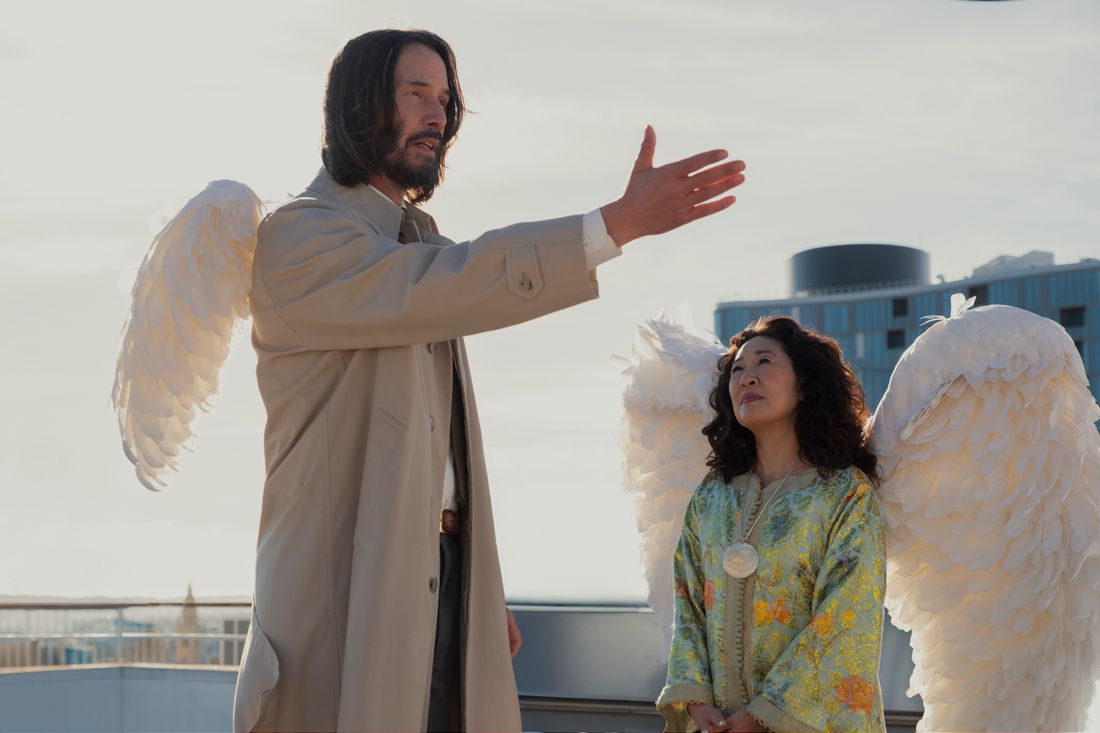
Approximately every few years, Aziz Ansari discovers a fresh sociological topic that significantly influences his creative output. During the mid 2010s, he delved into contemporary dating patterns, which shaped a substantial portion of his stand-up performances, the book “Modern Romance: An Investigation,” and season one of “Master of None.” His curiosity about aging was reflected in the finale joke of his 2017 special “Live at Madison Square Garden,” and would have led to his 2022 film project titled “Being Mortal” if it hadn’t been canceled due to misconduct allegations against lead actor Bill Murray during production. After this unfortunate incident, Ansari shifted focus to a new feature film inspired by another sociological subject. The movie, “Good Fortune,” premiered at the Toronto International Film Festival on September 6 and focuses on the gig economy.
Ansari portrays Arj, a struggling documentary editor based in L.A., who supplements his income by taking part-time jobs at a hardware store and a task management service called “Task Sergeant.” His tasks vary widely, from waiting in line for clients wanting viral cinnamon buns to tidying messy garages. The work is demanding and humbling, often placing Arj at the mercy of harsh clients who sometimes fail to pay for services affected by factors beyond his control, such as the popular cinnamon buns running out before his turn in line.
Among the individuals who occasionally employ Arj through the app is Jeff, a wealthy and typically tech-savvy character portrayed by Seth Rogen. Jeff boasts a vast hilltop residence, a garage stacked with luxury vehicles he’s not proficient in operating, and his very own sauna and cold plunge, which he meticulously uses according to ritual, despite admitting he’s unsure if they provide any advantages. For a brief period, Arj takes on the role of Jeff’s assistant, but he is dismissed due to an innocent error. This incident triggers a chain of events that culminates in the towage of his car, which he had been utilizing as temporary accommodation because he can’t afford a flat.
In this scenario, when the character portrayed by Keanu Reeves, named Gabriel (who happens to be a guardian angel working in the “texting-while-driving” division of divine intervention), notices a troubling text from Arj about giving up on life while he was driving, he feels compelled to act. Despite his boss, a higher-ranking angel played by Sandra Oh, forbidding it, Gabriel believes in Arj’s potential and tries to save him from losing his way. To demonstrate that life has meaning despite financial struggles, Gabriel switches their circumstances, showing Arj that money isn’t the ultimate solution to his problems. However, when their roles are reversed, Arj finds that his newfound wealth instantly solves most of his problems, making him hesitant to return to his original situation.
The predicament Jeff and Gabriel find themselves in becomes quite challenging, as their boss has reduced them to mere humans by penalizing them for going against her instructions. Meanwhile, Arj is living it up, leaving Jeff and Gabriel struggling to make ends meet financially. The movie emphasizes the harsh realities of the gig economy once more, showing how unfair it can be. Jeff takes a job as a delivery driver for a food app, discovering firsthand the long waits, harsh customer reviews, competition with automated carts, and losses due to gas costs. Similarly to Arj, they soon find themselves without a permanent place to stay, resorting to sleeping in their cars.
Although repetition is minimized, Ansari humorously explores various situations. He magnifies Arj’s new lifestyle extravagances, like a scene where Arj dines at a sushi restaurant with a high carbon footprint. He also extracts tragicomic elements from Jeff and Gabriel’s financial struggles, such as when Gabriel advises Jeff to find positives about sleeping in their car. However, the film shines brightest when it delves deeper into Gabriel’s transformation into a human being. Reeves, undoubtedly the standout performer, portrays Gabriel with a spot-on innocent charm, generating laughter from scenes like Gabriel’s first hamburger experience, his internet searches for baby elephant photos, and his unintentional consumption of psychedelic mushrooms.
Gradually, despite his initial purity, Gabriel’s life of poverty erodes his innocence. He finds employment as a dishwasher and alleviates the pressure by resorting to bad habits. Lamenting his descent from his former high status, he once laments, “I was once a celestial being, now I’m a regular smoker.” When Gabriel receives his first paycheck, he’s appalled at the tax and social security deductions, realizing it’s not enough to live on. He’s astounded to discover that Felipe, his colleague, works three jobs simultaneously to make ends meet. Ansari seems to imply that this situation should be surprising, not an accepted norm in contemporary America. This idea is thoughtful, but one doesn’t need to be a gig economy expert for it to ring true.
Read More
- All Golden Ball Locations in Yakuza Kiwami 3 & Dark Ties
- Hollywood is using “bounty hunters” to track AI companies misusing IP
- A Knight Of The Seven Kingdoms Season 1 Finale Song: ‘Sixteen Tons’ Explained
- Gold Rate Forecast
- What time is the Single’s Inferno Season 5 reunion on Netflix?
- Mario Tennis Fever Review: Game, Set, Match
- Beyond Linear Predictions: A New Simulator for Dynamic Networks
- All Songs in Helluva Boss Season 2 Soundtrack Listed
- This free dating sim lets you romance your cleaning products
- 4. The Gamer’s Guide to AI Summarizer Tools
2025-09-07 23:54